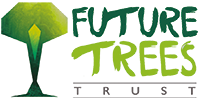At Future Trees Trust, we use selective breeding to improve the growth, form and health of seven broadleaved species. The high-quality, genetically diverse seed that we produce is used to plant new woodlands and provide outstanding British timber. Our work involves the identification of superior trees (plus trees) to establish seed orchards and progeny trials. Alongside our core species, we are also involved in a wide range of collaborative projects to use and conserve our forest genetic resources.

Representation of a typical tree improvement cycle. Superior trees are selected from woodlands (red arrow). Cuttings are taken to establish grafted clonal seed orchards which produce ‘qualified’ seed to be used by the forestry sector. The seed can also be used to evaluate the plus trees through progeny testing. Results from these progeny trials inform the removal of poor trees from the orchards, thereby improving the quality of the seed and elevating its status to ‘tested’.

Representation of a typical tree improvement cycle. Superior trees are selected from woodlands (red arrow). Cuttings are taken to establish grafted clonal seed orchards which produce ‘qualified’ seed to be used by the forestry sector. The seed can also be used to evaluate the plus trees through progeny testing. Results from these progeny trials inform the removal of poor trees from the orchards, thereby improving the quality of the seed and elevating its status to ‘tested’.
Sweet Chestnut
An honorary native with rot-resistant timber
Sycamore
A naturalised and fast-growing species
Walnut
The only species grown in Britain to produce dark timber
